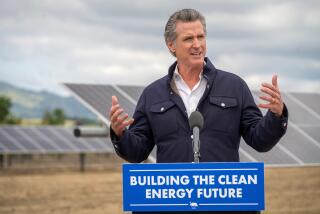Tap U.S. Innovation to Ease Global Warming
- Share via
Global warming is a serious threat. There is overwhelming evidence that increasing amounts of carbon dioxide and other greenhouse gases are heating up the Earth’s climate and that inaction could be disastrous.
One way to limit the release of greenhouse gases is a simple but powerful idea called “cap and trade,” which is at the core of a bill we are introducing in the Senate.
Past strategies have failed because of the belief -- and, sometimes, the reality -- that they would weigh down American businesses with costly and complicated new mandates.
Our proposal harnesses the genius of American enterprise by creating a market for companies that emit the greenhouse gases to compete to clean up our air. The bill would cap the country’s overall emissions and allow individual companies to find the most innovative and cost-effective ways to reduce their greenhouse gases. Under this system, companies would also be able to trade pollution credits with each other.
Our plan -- modeled after the successful acid rain trading program of the 1990 Clean Air Act -- would return to 2000 carbon dioxide emission levels by 2010. Every decade would bring more progress. The plan gives American businesses extensive flexibility in tackling the problem as long as they tackle the problem.
The “cap and trade” system is a constructive, business-friendly approach to countering global warming. Ignoring global warming threatens our environment, our economy and our international credibility.
First, our environmental health. Glaciers are melting, coral reefs are dying and ocean temperatures are rising. Just last week, two major new research studies said global warming was already posing a dire threat to the world’s plants and animals. Last month, the National Oceanic and Atmospheric Administration reported that 2002’s average global temperature will probably be the second warmest on record. The 10 warmest years have all occurred since 1987, with nine of them since 1990.
Second, our economic vitality. Businesses now receive a confusing set of messages about this problem from the federal government. They know that with climate change worsening every year, the government will at some point have to require them to reduce their emissions. However, businesses are being left in the lurch about Washington’s global warming policy plans and, therefore, have a perverse short-term incentive to put off any long-term technology investments.
The innovation community in the United States is eager to participate but, because of government inaction, is unable to fully do so. The European Union and Japan already have a head start in the pollution reduction industry.
Third, our international credibility. The U.S. produces about a quarter of the world’s greenhouse gases but has shown an unwillingness to produce any of the world’s climate-change solutions. That is compromising our international stature and relationships with our most important allies when we need them the most.
We should never compromise critical U.S. policy simply to satisfy the international community. But in this case, doing what will earn respect and support around the world is also in our own best environmental and economic interests and is the right thing to do.
Even if, despite all the evidence, one chooses to remain a skeptic on climate change, taking action today -- as an insurance policy -- is the only wise course of action. As the mercury rises, so does the need for a creative solution. We’re offering one.
*
Joseph I. Lieberman (D-Conn.) is a member of the Senate Environment and Public Works Committee; John McCain (R-Ariz.) is a member of the Senate Commerce Committee.


